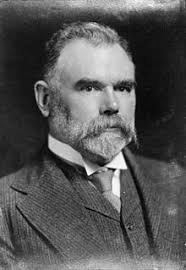

1853 - 1930
Thomas Mackenzie’s short term as prime
minister began when he won a leadership contest following Joseph Ward’s
resignation, and ended when the Liberal party lost a confidence vote four months
later.
Mackenzie was a close contemporary of Joseph
Ward. He was born three years earlier, died just three months earlier and both
had entered parliament in 1887.
He was an outdoors man, a conservationist and
explorer. Mackenzie Pass in Fiordland is named after him. Aside from his
parliamentary career he was active in local body politics. He was an MP for 21
years. His sympathies lay with the farming community and as an independent
member he identified with the conservative wing of the Liberals. He finally
joined them in 1908 and from 1909 proved to be an effective minister of
agriculture under Joseph Ward. He also held the portfolios of industries and
commerce and tourism.
Nonetheless the Liberal
party was tottering towards its demise during the 1908-1911 parliamentary term
and, as a sign that some in the party believed a change in direction was needed, by 1911 there were at
least four MPs showing interest in standing for the leadership should Ward
decide to retire. After the disastrous 1911 election and Ward indeed resigning
the following year, nobody expected the conservative Thomas Mackenzie to be a
serious contender to replace him. He was not one of the original four vying for
the leadership. Radical policies outlined in Ward’s 1911 speech from the throne
had indicated the party was drifting to the left. A more likely contender was
minister of labour John Millar whose
union background fitted better with the party’s position. But Millar was
unpopular and unlikely to attract badly needed Reform voters. Mackenzie
gradually emerged as a potential leader. After an acrimonious campaign in March,
1912 Millar withdrew his candidacy, two other hopefuls had lost their seats in
the election leaving the insignificant figure of George Laurenson remaining as
the only opposition to Mackenzie. Mackenzie won by 22 votes to 9 in what was the
first leadership contest to be voted on by the entire caucus in Liberal party
history.
But with the party split between rural and
urban factions and support from independent members ebbing away Mackenzie’s
government was doomed from the start. A vote of no confidence called by
opposition leader William Massey in July was passed by 41 votes to 33, thus
ending Mackenzie’s brief ministry.
While his term as prime minister was
insignificant Mackenzie was an imposing and dignified figure. He was a good
debater and a witty speaker although occasionally bombastic. He was good-natured
and mixed well, especially in high society. While undoubtedly ambitious, his
rise to the prime minister’s office was purely a matter of chance. For seventeen
of his twenty-one years in parliament he was outside the government and relished
his role there as a free and independent member able to pursue his ambitions by
promoting conservation and supporting the interests of small farmers and
businessmen.
After the Liberal party’s demise Mackenzie was
appointed British high commissioner and served in that role during the turbulent
war years. On his return he was knighted and appointed to the legislative
council.